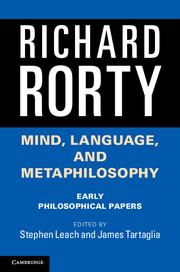Book contents
- Frontmatter
- Contents
- Foreword
- Acknowledgments
- Introduction
- 1 Pragmatism, categories, and language
- 2 The limits of reductionism
- 3 Realism, categories, and the “linguistic turn”
- 4 The subjectivist principle and the linguistic turn
- 5 Empiricism, extensionalism, and reductionism
- 6 Mind-body identity, privacy, and categories
- 7 Do analysts and metaphysicians disagree?
- 8 Incorrigibility as the mark of the mental
- 9 Wittgenstein, privileged access, and incommunicability
- 10 In defense of eliminative materialism
- 11 Cartesian epistemology and changes in ontology
- 12 Strawson’s objectivity argument
- 13 Verificationism and transcendental arguments
- 14 Indeterminacy of translation and of truth
- 15 Dennett on awareness
- 16 Functionalism, machines, and incorrigibility
- Index of names
- References
6 - Mind-body identity, privacy, and categories
Published online by Cambridge University Press: 05 June 2014
- Frontmatter
- Contents
- Foreword
- Acknowledgments
- Introduction
- 1 Pragmatism, categories, and language
- 2 The limits of reductionism
- 3 Realism, categories, and the “linguistic turn”
- 4 The subjectivist principle and the linguistic turn
- 5 Empiricism, extensionalism, and reductionism
- 6 Mind-body identity, privacy, and categories
- 7 Do analysts and metaphysicians disagree?
- 8 Incorrigibility as the mark of the mental
- 9 Wittgenstein, privileged access, and incommunicability
- 10 In defense of eliminative materialism
- 11 Cartesian epistemology and changes in ontology
- 12 Strawson’s objectivity argument
- 13 Verificationism and transcendental arguments
- 14 Indeterminacy of translation and of truth
- 15 Dennett on awareness
- 16 Functionalism, machines, and incorrigibility
- Index of names
- References
Summary
Introductory
Current controversies about the Mind-Body Identity Theory form a case-study for the investigation of the methods practiced by linguistic philosophers. Recent criticisms of these methods question that philosophers can discern lines of demarcation between “categories” of entities, and thereby diagnose “conceptual confusions” in “reductionist” philosophical theories. Such doubts arise once we see that it is very difficult, and perhaps impossible, to draw a firm line between the “conceptual” and the “empirical,” and thus to differentiate between a statement embodying a conceptual confusion and one that expresses a surprising empirical result. The proponent of the Identity Theory (by which I mean one who thinks it sensible to assert that empirical inquiry will discover that sensations (not thoughts) are identical with certain brain-processes) holds that his opponents’ arguments to the effect that empirical inquiry could not identify brain-processes and sensations are admirable illustrations of this difficulty. For, he argues, the classifications of linguistic expressions that are the ground of his opponents’ criticism are classifications of a language which is as it is because it is the language spoken at a given stage of empirical inquiry. But the sort of empirical results that would show brain-processes and sensations to be identical would also bring about changes in our ways of speaking. These changes would make these classifications out of date. To argue against the Identity Theory on the basis of the way we talk now is like arguing against an assertion that supernatural phenomena are identical with certain natural phenomena on the basis of the way in which superstitious people talk. There is simply no such thing as a method of classifying linguistic expressions that has results guaranteed to remain intact despite the results of future empirical inquiry. Thus, in this area (and perhaps in all areas) there is no method which will have the sort of magisterial neutrality of which linguistic philosophers fondly dream.
- Type
- Chapter
- Information
- Mind, Language, and MetaphilosophyEarly Philosophical Papers, pp. 106 - 131Publisher: Cambridge University PressPrint publication year: 2014
References
- 2
- Cited by



